At least eight states are planning to ban the sale of new gasoline-powered cars in the next decade, and others are considering joining them.
Only zero-emission vehicles can be sold in participating states starting with the 2035 model year, under the Advanced Clean Cars II legislation.
The rule, which was first adopted in California, means that automakers and dealers would henceforth be prohibited from selling new gasoline-powered cars in these states.
However, Americans will not be forced to take their gasoline cars off the roads and will still be able to purchase used and second-hand gasoline vehicles.
These states have gone further than the latest federal legislation announced last week, where the Biden administration released new rules to phase out gas-powered cars by 2032.
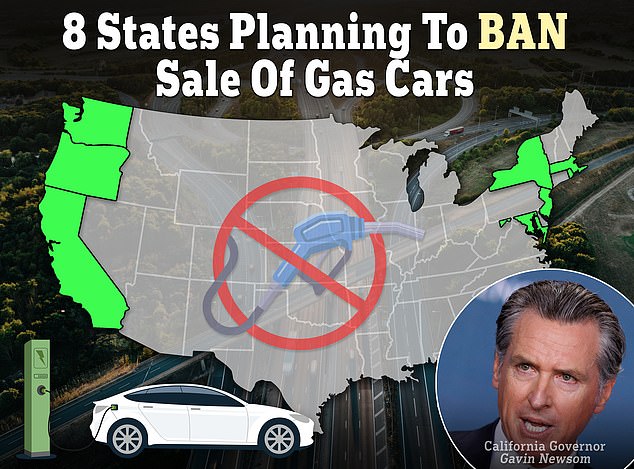
At least eight states plan to ban the sale of new gasoline-powered cars in the next decade, and others are considering joining them.
New federal legislation requires automakers to reduce tailpipe emissions from new vehicles by about 50 percent from model years 2026 to 2032.
To achieve this, the Environmental Protection Agency (EPA) aims that between 35 and 56 percent of vehicles must be electric vehicles by 2032, and between 13 and 36 percent must be plug-in hybrids by that date.
It was initially proposed that two-thirds of all cars sold by 2030 would have to be electric vehicles, but last week that plan was put on hold, giving a concession to automakers and giving them more ways to comply.
But automakers will eventually stop making all-gasoline-powered successors to the beloved sports cars of the 1960s and 1970s under Biden’s new edict.
For now, though, Dodge announced earlier this month that the 2024 Charger will be available as a gasoline-powered muscle car and as a new all-electric vehicle.
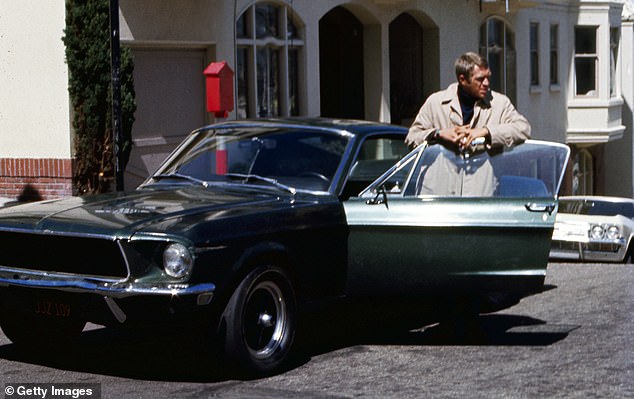

Automakers will eventually stop making all-gasoline-powered successors to the beloved sports cars of the 1960s and 1970s (pictured: Steve McQueen in Bullitt)
According to the personal finance site MoneyCalifornia was the first state to adopt the Advanced Clean Cars II rule, which will completely ban new sales of gasoline cars by 2035.
Plans in the state, led by Gov. Gavin Newsom, specify that 35 percent of all new car sales will need to be zero-emission by 2026, rising to 68 percent by 2030.
Rhode Island was the latest state to join the list of states pledging to ban the sale of gasoline-powered cars, joining Maryland, Massachusetts, New Jersey, New York, Oregon and Washington.
According to the site, the District of Columbia also made the commitment.
Other states have adopted versions of the legislation but have not yet committed to banning gas-powered cars entirely by that date.
For example, Delaware and Colorado last year finalized rules that would require 82 percent of new cars to be zero-emission vehicles by 2032, but officials have not adopted bans by 2035.
Meanwhile, New Mexico announced in July that it will set annual goals for the sale of zero-emission vehicles and may adopt parts of the Advanced Clean Cars II legislation. But he has not yet endorsed the 2035 ban.
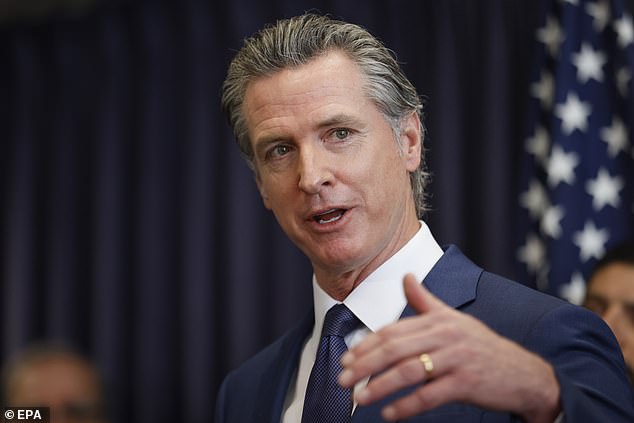

California was the first state to adopt the Advanced Clean Cars II rule (pictured: California Governor Gavin Newsom)
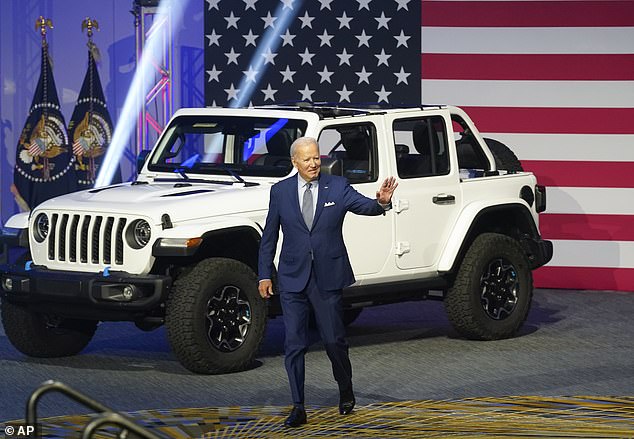

The Biden administration last week released new rules to phase out gas-powered cars by 2032.
As states unveil new plans to ban the sale of gasoline cars after a certain point, the idea is to pressure automakers to accelerate their production of electric and hybrid vehicles.
According to Kelley Blue Book, electric vehicles accounted for 7.6 percent of new car sales in 2023.
Although this figure is up from 3.2 percent in 2021, there is a clear disparity across the country in who is switching to electric cars.
Data from earlier this year revealed how Americans in some areas are purchasing more than 10 times as many electric vehicles as others.
The West Coast, and California in particular, continued to dominate the market last year, according to figures from market research firm S&P Global Mobility.
But in other places, including the so-called “Motor City” of Detroit, the country’s automobile capital, there are hardly any residents buying electric cars.
However, some large automakers are increasing production of electric cars. General Motors, for example, hopes to have completed a full transition to electric vehicle sales by 2035.
In San Jose, nearly 40 percent of new car registrations last year were electric, the most of any major metropolitan area. In Detroit, however, only 3 percent of registrations were electric vehicles.
But hybrid cars are being bought three times faster at dealerships than electric cars, separate data reveals.
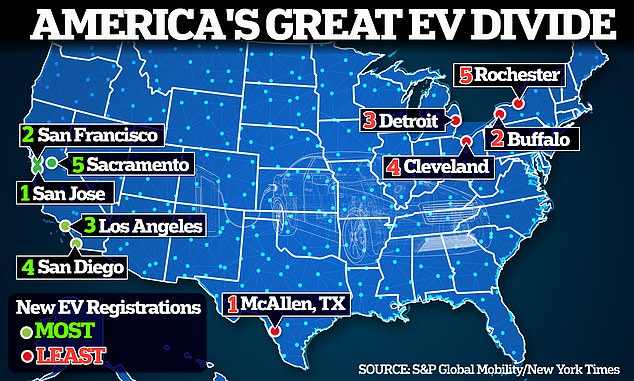

Electric car adoption has stalled in many parts of the United States: Only 3 percent of new sales are electric vehicles in some states.
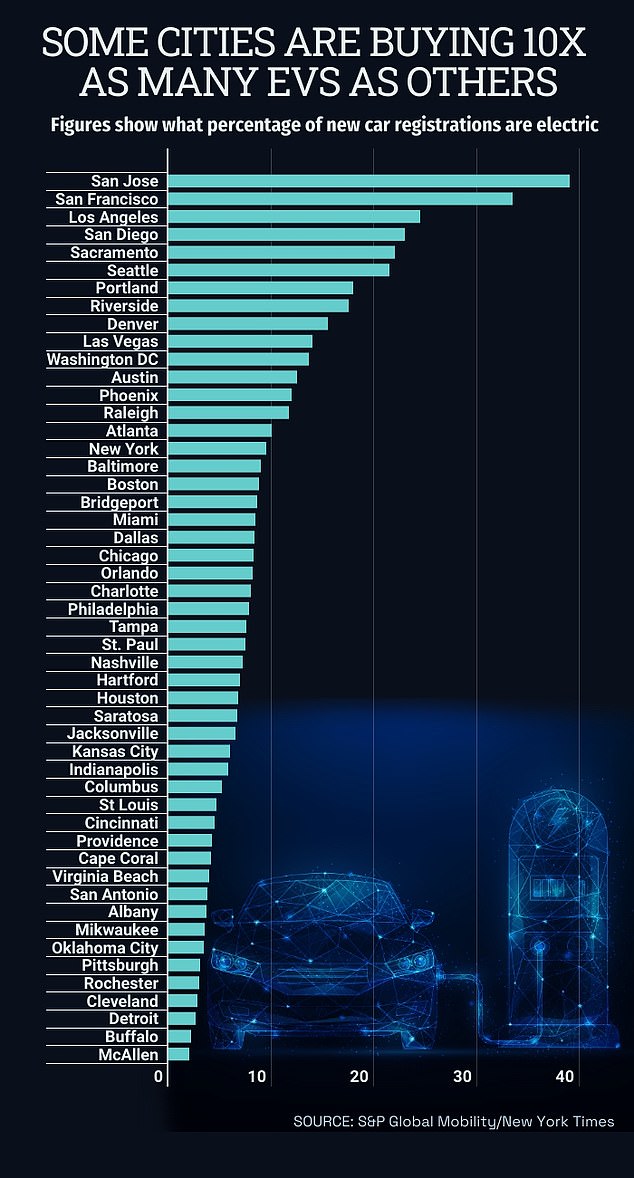

Americans in some areas are buying more than 10 times as many electric vehicles as in others, new data reveals.
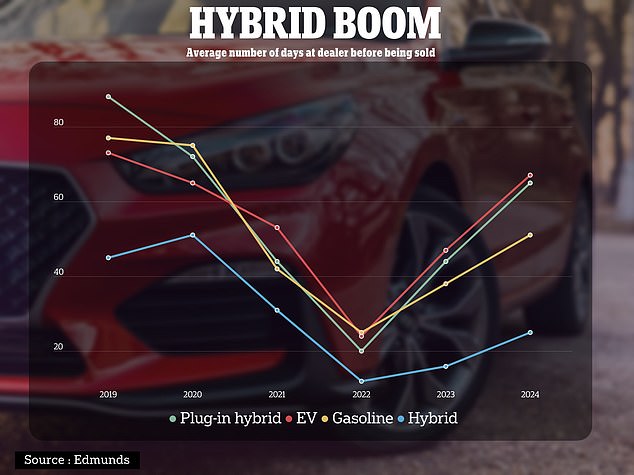

According to research site Edmunds, these vehicles also sell twice as fast as gasoline cars and three times as fast as electric cars.
And the latest federal rules released by the Biden administration last week have given hybrid cars a larger role in helping reduce tailpipe emissions.
According to the research site Edmunds, hybrid vehicles also sell twice as fast as gasoline-powered vehicles.
A traditional hybrid vehicle has a gasoline-powered internal combustion engine and an electric motor (a battery) that work together to power the car.
Last month, hybrids typically flew out of dealerships in 25 days, Edmunds found, while electric vehicles took an average of 72 days. Gasoline cars, meanwhile, typically sell out after 52 days.
Hybrid vehicles overtook all-electric and gasoline cars to lead this year’s closely watched Consumer Reports Top Cars ranking.
